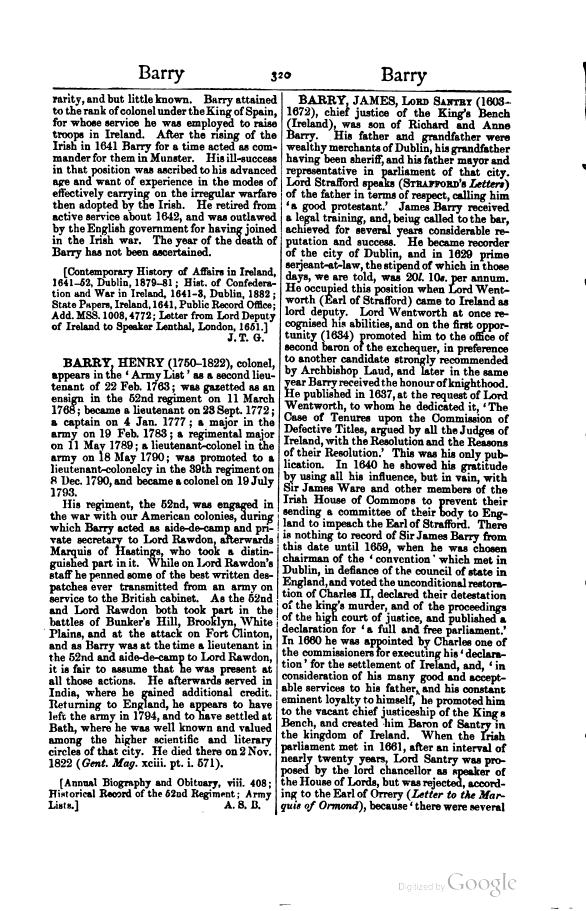rarity, and but little known. Barry attained to the rank of colonel under the King of Spain, for whose service he was employed to raise troops in Ireland. After the rising of the Irish in 1641 Barry for a time acted as commander for them in Munster. His ill-success in that position was ascribed to his advanced age and want of experience in the modes of effectively carrying on the irregular warfare then adopted by the Irish. He retired from active service about 1642, and was outlawed by the English government for having joined in the Irish war. The year of the death of Barry has not been ascertained.
[Contemporary History of Affairs in Ireland, 1641-52, Dublin, 1879-81; Hist, of Confederation and War in Ireland, 1641-3, Dublin, 1882; State Papers, Ireland, 1641, Public Record Office; Add. MSS. 1008, 4772; Letter from Lord Deputy of Ireland to Speaker Lenthal, London, 1651.]
BARRY, HENRY (1750–1822), colonel, appears in the 'Army List' as a second lieutenant of 22 Feb. 1763; was gazetted as an ensign in the 52nd regiment on 11 March 1768; became a lieutenant on 23 Sept. 1772; a captain on 4 Jan. 1777; a major in the army on 19 Feb. 1783; a regimental major on 11 May 1789; a lieutenant-colonel in the army on 18 May 1790; was promoted to a lieutenant-colonelcy in the 39th regiment on 8 Dec. 1790, and became a colonel on 19 July 1793.
His regiment, the 52nd, was engaged in the war with our American colonies, during which Barry acted as aide-de-camp and private secretary to Lord Rawdon, afterwards Marquis of Hastings, who took a distinguished part in it. While on Lord Rawdon's staff he penned some of the best written despatches ever transmitted from an army on service to the British cabinet. As the 52nd and Lord Rawdon both took part in the battles of Bunker's Hill, Brooklyn, White Plains, and at the attack on Fort Clinton, and as Barry was at the time a lieutenant in the 52nd and aide-de-camp to Lord Rawdon, it is fair to assume that he was present at all those actions. He afterwards served in India, where he gained additional credit. Returning to England, he appears to have left the army in 1794, and to have settled at Bath, where he was well known and valued among the higher scientific and literary circles of that city. He died there on 2 Nov. 1822 (Gent. Mag. xciii. pt. i. 571).
[Annual Biography and Obituary, viii. 408; Historical Record of the 52nd Regiment; Army Lists.]
BARRY, JAMES, Lord Santry (1603–1672), chief justice of the King's Bench (Ireland), was son of Richard and Anne Barry. His father and grandfather were wealthy merchants of Dublin, his grandfather having been sheriff, and his father mayor and representative in parliament of that city. Lord Strafford speaks (Strafford's Letters) of the father in terms of respect, calling him 'a good protestant.' James Barry received a legal training, and, being called to the bar, achieved for several years considerable reputation and success. He became recorder of the city of Dublin, and in 1629 prime serjeant-at-law, the stipend of which in those days, we are told, was 20l. 10s. per annum. He occupied this position when Lord Wentworth (Earl of Strafford) came to Ireland as lord deputy. Lord Wentworth at once recognised his abilities, and on the first opportunity (1634) promoted him to the office of second baron of the exchequer, in preference to another candidate strongly recommended by Archbishop Laud, and later in the same year Barry received the honour of knighthood. He published in 1637, at the request of Lord Wentworth, to whom he dedicated it, 'The Case of Tenures upon the Commission of Defective Titles, argued by all the Judges of Ireland, with the Resolution and the Reasons of their Resolution.' This was his only publication. In 1640 he showed his gratitude by using all his influence, but in vain, with Sir James Ware and other members of the Irish House of Commons to prevent their sending a committee of their body to England to impeach the Earl of Strafford. There is nothing to record of Sir James Barry from this date until 1659, when he was chosen chairman of the 'convention' which met in Dublin, in defiance of the council of state in England, and voted the unconditional restoration of Charles II, declared their detestation of the king's murder, and of the proceedings of the high court of justice, and published a declaration for 'a full and free parliament,' In 1660 he was appointed by Charles one of the commissioners for executing his 'declaration' for the settlement of Ireland, and, 'in consideration of his many good and acceptable services to his father, and his constant eminent loyalty to himself,' he promoted him to the vacant chief justiceship of the King's Bench, and created him Baron of Santry in the kingdom of Ireland. When the Irish parliament met in 1661, after an interval of nearly twenty years, Lord Santry was proposed by the lord chancellor as speaker of the House of Lords, but was rejected, according to the Earl of Orrery (Letter to the Marquis of Ormond), because 'there were several
